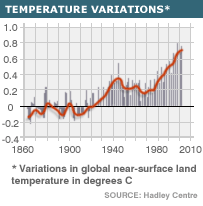Climate Change
Climate change is one of the greatest environmental, social and economic threats facing the planet.
During the last century, the Earth's average surface temperature rose by around 0.6°C. Evidence is getting stronger that most of the global warming that has occurred over the last 50 years is attributable to human activities. In its Third Assessment Report, published in 2001, the Intergovernmental Panel on Climate Change (IPCC) projects that global average surface temperatures will rise by a further 1.4 to 5.8°C by the end of this century. This global temperature increase is likely to trigger serious consequences for humanity and other life forms alike, including a rise in sea levels of an estimated 9 to 88 cm by the end of this century, which will endanger coastal areas and small islands, and a greater frequency and severity of extreme weather events.
 Human activities
that contribute to climate change include in particular the burning of fossil
fuels and deforestation, both of which cause emissions of carbon dioxide (CO2),
the main gas responsible for climate change, as well as other 'greenhouse'
gases. In order to bring climate change to a halt, global greenhouse gas
emissions must be reduced significantly
Human activities
that contribute to climate change include in particular the burning of fossil
fuels and deforestation, both of which cause emissions of carbon dioxide (CO2),
the main gas responsible for climate change, as well as other 'greenhouse'
gases. In order to bring climate change to a halt, global greenhouse gas
emissions must be reduced significantly
The European Union (EU) is at the forefront of international efforts to combat climate change and has played a key role in the development of the two major treaties addressing the issue, the United Nations Framework Convention on Climate Change and its Kyoto Protocol.
EU negotiators are presently working to achieve agreement on a number of outstanding issues relating to the Kyoto Protocol and to pave the way for future action beyond 2012 at the 10th Conference of Parties to the UNFCCC (COP-10). This annual meeting is being held from 6th - 17th December 2004 in Buenos Aires, Argentina. Further information about the Conference and the EU's efforts to maintain momentum in dealing with the threat of climate change can be found at:
The EU is also taking serious steps to address its own greenhouse gas emissions. In March 2000 the Commission launched the European Climate Change Programme (ECCP). The ECCP led to the adoption of a range of new policies and measures, among which the EU's emissions trading scheme, which will start its operation on 1 January 2005, will play a key role. As a result of the EU's and individual Member States actions, the latest monitoring data indicates that the European Union has delivered on its long-standing commitment to stabilise emissions of CO2 at the level of 1990 in the year 2000. The EU-15 is committed to deliver the collective 8% cut in emissions by 2008-2012 to which it signed up under the Kyoto Protocol. Equally the New Member States are determined to meet their individual targets under the Kyoto Protocol.
The Kyoto Protocol is only a first step to address the serious threat of climate change. Further action must be taken after 2012, the end of the Kyoto Protocol's 'first commitment period'. In order to prepare for the EU's input in the further development of the global climate change regime 'post 2012', the Commission has started a stakeholder dialogue, inviting stakeholder participation in preparing the EU's contribution to the shaping the future global climate change regime.
)window.location='http://www.europa.eu.int/comm/environment/climat/images/kyoto_16_02_2005_red_small.gif') |
President Barroso's message for Kyoto Celebrations (16/02/2005) |
|---|
| Last update: |
|
|

